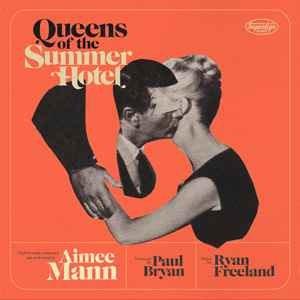AIMEE MANN In 2018, singer-songwriter Aimee Mann agreed to write songs for a stage adaptation of Girl, Interrupted, Susannah Kaysen’s memoir about her hospitalization at McLean Hospital in the late 1960s. It was material that Mann understood well, having had her own struggles with mental illness. She resonated with the oddball tone of the text, which was at once darkly funny, harrowing and detached. Also, she loved musicals.
Queens of The Summer Hotel
The collaboration, like so many other theatrical projects, got put on hold by the pandemic. But the beautiful result is Queens of the Summer Hotel, a song cycle constructed from music that Mann wrote for the show, sung by Mann and orchestrated with her longtime collaborator Paul Bryan using strings and woodwinds in a nod to the project’s theatrical origins. “Queens,” whose title comes from an Anne Sexton poem, was written more quickly than any of Mann’s previous projects in a burst of intensity that startled her. Like much of her songwriting, it’s marked by a dry-eyed wit and searching vulnerability. But the assignment to write songs for someone else’s project offered the artist a sense of liberation, freeing her to enter another person’s consciousness, another person’s story—and a brand-new set of musical structures—through the lens of Kaysen’s own alienation. Although several different characters narrate the songs, they’re not strictly tied to any narrative. But together, they form a portrait of one woman’s crisis of disassociation, seen through another woman’s generous eyes.
In “You Fall,” a woman observes her own breakdown, minute by minute, drink after drink. In “Robert Lowell and Sylvia Plath,” about the poets who wrote about their own time at McLean, the narrator observes herself observing herself: “You watch yourself until you’re out of reach/Now you’re split in two/And each side still isn’t you.” In the jaunty, sinister “Give Me Fifteen,” a doctor brags about how fast he is able to diagnose a woman, slotting any non-conformist into “a couple boxes self-appointed foxes put their chickens in.”
Many of the songs on Queens of The Summer Hotel spiral around melancholic insights. “At The Frick Museum” is a memory gazing at the Vermeer painting “Girl, Interrupted At Her Music,” realizing that it “felt like a warning.” The spine-chilling “Home By Now” is a deceptive lullaby about a sexually abusive father that circles, eerily, around the slogan, “If you lived here you’d be home by now.” “Checks” captures the sounds of hospital rounds, while “Little Chameleon” wryly invokes art therapy. In “You Don’t Have the Room,” the narrator wrestles with her own fragility, singing, “I’m sure a stronger girl could rise above/The twin desires of dignity and love.”
Like much of Mann’s best music, “Queens” goes to dark places with a disarming clarity. In the wrenching “Suicide Is Murder,” the narrator imagines various ways to off herself—“picture yourself in the snow, turning blue”—concluding, like a detective of her worst impulses, “You’ve got to have the stomach for a heartless killing spree.” In the chummy “You Could Have Been A Roosevelt,” a woman speaks with a friend about the freedom “just to be a girl/With Jean Nate and Pink Camay and Yardley Soap.” In “Burn It Out,” the narrator wonders if she can immolate her shameful secrets “so thoroughly/you’ll never see a trace of yourself in the spark.” In “In Mexico,” an addict knows that “I’m the crazy one they can point to.”
The album ends with a pair of lost-and-found songs. In “You’re Lost,” Mann describes the terror of a broken self, “A pill on your tongue dissolving/An egg outside its shell.” Yet the final song holds out hope for some kind of fix, a connection to someone who has been through the same troubles. In the lovely, spare “I See You,” the narrator reassures a girl who struggles to keep despair at bay, letting her know that she’s not alone: “There is a girl over a cliff, trying to break her fall— I see you!”
Mann grew up in Richmond, VA. When she was twelve, sick with mono, she pulled a guitar from her brother’s closet and discovered that writing songs offered her a new kind of power: they were a way to speak about feelings she didn’t even know she felt, including feelings about her own chaotic family history. She studied at the Berklee College of Music and then, during her early twenties, shot to fame as the frontwoman for the 1980s power-punk band ’Til Tuesday, with her first hit song, the iconic single “Voices Carry.”
In 1990 Mann went sol and ran into a wave of resistance from record companies, even as she produced brilliant album after brilliant album, nine of them over the next quarter century. Along the way, she forged a powerful new sound driven by her distinctive singing style: stripped-down, folky-acoustic but also forceful and cerebral, exploring psychological themes with dark wit and an eye for the world’s ugliest power plays. Among these albums was the 1999 soundtrack to Magnolia, which was nominated for an Oscar for Best Song for “Save Me.” NPR voted her one of the “Top 10 Best Living Songwriters” along with Paul McCartney, Bob Dylan and Bruce Springsteen. She has also made numerous cameo appearances in films such as The Big Lebowski and TV shows like “Portlandia” and “The Assassination of Gianni Versace: American Crime Story,” the latter of which found her singing an indelible cover of the Cars song “Drive.”
For Mann, though, the true shift in her career came in 1999, in the aftermath of Magnolia, when she broke away from the music industry to create her own label, SuperEgo Records, and control her own creative path. Since then, Mann has made a wide variety of bold, iconoclastic projects, in collaboration with artists such as Ben Gibbard, James Mercer, Jonathan Coulton, Patton Oswalt and Fred Armisen, including her Grammy-Award winning album Mental Illness. Queens of The Summer Hotel is another stage in that journey, a leap into confident experimentation, where Mann continues her propensity for making art without having to squeeze herself into the shapes the industry demands.
For more information, please contact Cami Opere, Louis D’Adamio or
Carla Sacks 212.741.1000 at Sacks & Co.

